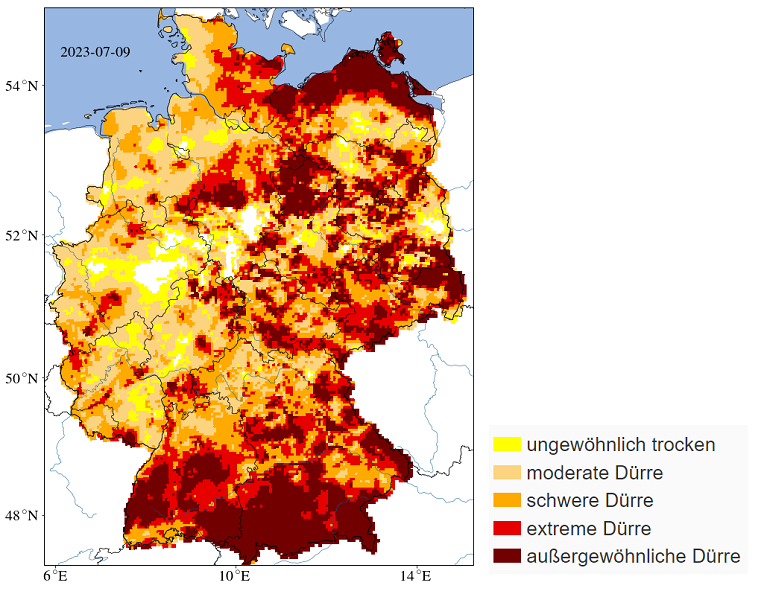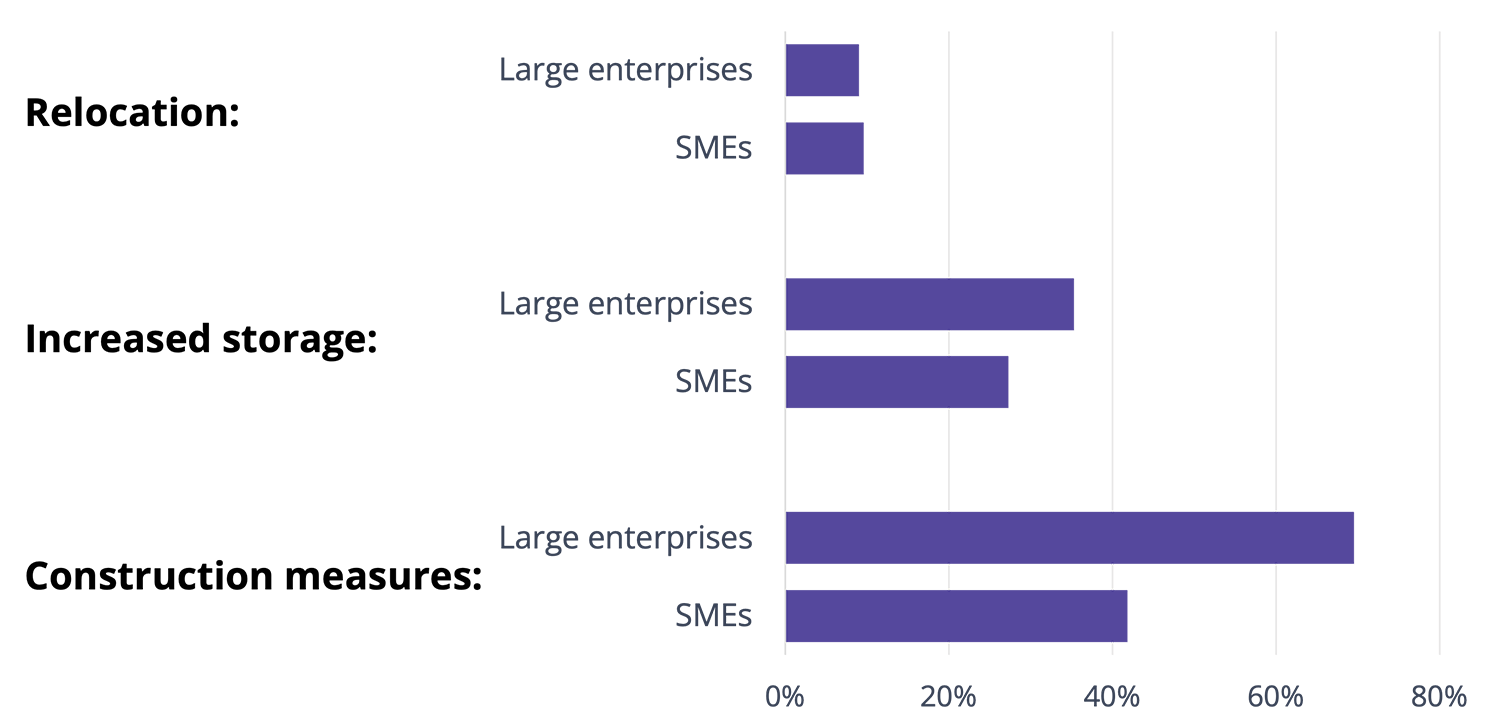Avison Young: Climate risks influence location decisions

UFZ-Dürremonitor
Helmholtz-Zentrum für Umweltforschung GmbH – UFZ. Stand: 09.07.2023 1)
Frankfurt am Main, 14 July 2023 - It's that time of year again: low water levels on German rivers have been affecting navigability since mid-June. Transport is becoming more complicated and more expensive - which could slow down the decline in inflation and the economic recovery.
These effects will not be felt this year. However, the volume of transport on German inland waterways in 2022 was the lowest2 since the German reunification in 1990. One of the reasons for this was the low water levels in August. From mid to late June of this year, however, the drought situation in Germany worsened significantly again, and water levels on the Rhine were already lower than in the drought years of 2018 and 2022.
Although other major events, such as geopolitical ones, are currently keeping the economy and society on tenterhooks, the consequences of climate change will not diminish as a result. On the contrary, its impact on the transport and property sectors, for example, will continue to grow. Moreover, parts of Germany's transport infrastructure and many buildings are not designed for climate change. Major adjustments will have to be made.
Actions taken and planned* because of increase in climate risks

*Excerpt (basis: survey among German companies in 2022, by size of company. SME = Small and medium-sized enterprises).
Source: Institut für Mittelstandsforschung Bonn, 2023
More than three-quarters of German small and medium-sized enterprises (SMEs) and almost 90 percent of large companies3 expect that the effects of climate change (e.g. extreme weather events) and the transition to more sustainable business practices will have an impact on their own business activities. German companies' responses to increased climate risks include relocation, increased stockpiling and construction measures.
The sometimes significant percentage differences in adaptation measures are probably mainlydue to the fact that they are less easily implemented by SMEs than by large companies. However, the necessary responses, both at the level of individual companies and the economy as a whole, also offer opportunities: the path to achieving the climate targets opens up new business models, for example in the operational and structural adaptation of existing structures and the sustainable development of new ones. These include energy supply and use, and sustainable procurement and production processes, where the circular economy will play an increasingly important role. The desire for protection against climate risks alone paves the way for far-reaching initiatives: almost half3 of German companies do not yet feel sufficiently protected against a climate risk (including heat, precipitation, drought).
What does this have to do with the property industry?
Climate change has long been an important factor in business location decisions - for industry as well as for retailers, service providers and office users. Heatwaves and droughts threaten smooth production. Industry and trade also depend on the smooth movement of goods and the supply of raw materials and intermediate products. Germany is also dependent on countries that could be severely affected by the consequences of climate change.
Property investors have also long taken climate risks into account in their investment strategies.
Climate change is leading to increasingly extreme weather conditions. This can cause damage to industrial, manufacturing and logistics properties, resulting in production and delivery disruptions.
Office buildings that use green roofs and facades to significantly reduce summer temperatures contribute to a more pleasant microclimate and have a positive effect on the well-being of employees. They also require less air conditioning, have lower emissions and cause lower energy costs – a real location argument for occupiers now and in the future.
Real estate, such as data centres, will be in demand from customers and investors in the future. Until now, they have used "huge amounts" of electricity and produced large emissions, but they will soon be able to operate in a CO2-neutral manner and be independent of external energy sources. As a reliable power supply is one of the most important location requirements for data centres, a self-sufficient power supply makes these properties more autonomous in their choice of location in this respect.
Whereas in the past, goods or preliminary products were delivered to the production process in a time-critical manner by means of stockless procurement logistics, for example to reduce the amount of capital tied up in the company, a switch to buffer stocks – in order to be able to compensate for delivery fluctuations – will in future require more storage space, including corresponding real estate. This will change the logistics processes and the location requirements of the companies as well as, for example, the domestic development of battery and cell competence in the German automotive industry through a significant expansion of research and development in Germany. Irrespective of this trend in the German automotive industry and due to the energy crisis, logistics companies are increasingly converting their truck fleets to electric mobility, such as Aldi Nord. In addition, companies are increasingly moving away from the traditional logistics locations in the metropolitan regions to new locations that offer more space and potential, for example in terms of transport infrastructure. One example of this is the new logistics centre near Neu Wulmstorf, which will be leased in the future because it offers larger areas and is located on the A26 motorway. Outside the metropolitan regions, there are even more brownfield sites that meet the changing needs of logistics companies for more space. As with other asset classes, the logistics industry is currently adapting to Germany's long-term climate targets to reduce its carbon footprint, for example by switching to e-mobility, greening properties or using photovoltaic systems.
1) The map with the official name "Drought Total Soil" shows the soil moisture index in Germany down to a depth of about 1.80 metres in five categories. Current soil moisture levels are exceptionally low by long-term standards.
2) Federal Statistical Office, 2023
3) Institute for SME Research, 2023
Frankfurt am Main, 14. Juli 2023 – Es ist wieder so weit: Das Niedrigwasser auf deutschen Flüssen reduzierte bereits Mitte Juni die Schiffbarkeit. Transporte werden aufwändiger und teurer – das könnte nicht zuletzt den Rückgang der Inflation verlangsamen. Auch kann die konjunkturelle Erholung gebremst werden.About Avison Young
Avison Young creates real economic, social and environmental value as a global real estate advisor, powered by people. As a private company, our clients collaborate with an empowered partner who is invested in their success. Our integrated talent realizes the full potential of real estate by using global intelligence platforms that provide clients with insights and advantage. Together, we can create healthy, productive workplaces for employees, cities that are centers for prosperity for their citizens, and built spaces and places that create a net benefit to the economy, the environment and the community.
Media contact:
ROZOK GmbH
Martina Rozok
M +49 170 23 55 988
